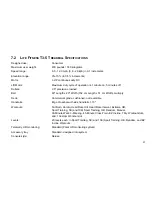
The optimum operating position of the striding belt is from 1.75" (45 mm) to 2.25" (57 mm) from either side of the frame.
If the striding belt travels beyond this position, see How to Adjust and Tension the Striding Belt or contact Life Fitness
Customer Support Services for proper alignment instructions, 1-800-328-9714 (USA).
*NOTE:
When cleaning the exterior of the unit, a non-abrasive cleaner and soft cotton cloth are strongly recommended.
At no time should cleaner be applied directly to any part of the equipment; use non-abrasive cleaner on a soft cloth and
then wipe the unit.
6.2
T
ROUBLESHOOTING
T
HE
H
EART
R
ATE
C
HEST
S
TRAP
H
EART
R
ATE
R
EADING
I
S
E
RRATIC
O
R
A
BSENT
E
NTIRELY
•
Repeat the electrode wetting procedure (see How to Use the Heart Rate Monitor Chest Strap). The electrodes must
be wet to pick up and transmit accurate heart rate readings.
•
Make sure the electrodes are flat against the skin.
•
Wash the belt transmitter regularly with mild soap and water.
•
Make sure the chest strap transmitter is within three feet (one meter) of the heart rate receiver.
•
The chest strap is battery operated and will eventually stop functioning. If the chest strap transmitter battery is deplet-
ed, contact Life Fitness Customer Support Services at 1-800-328-9714 for instructions on how to have the chest strap
replaced.
H
EART
R
ATE
R
EADING
I
S
E
RRATIC
O
R
E
XTREMELY
H
IGH
When exercising with the heart rate chest strap, you may come within range of electromagnetic signals strong enough to
cause abnormally elevated heart rate readings. Possible sources of such signals include:
•
Television sets and/or antennas, cell phones, computers, cars, high voltage power lines, and other motor driven
equipment.
•
Another heart rate transmitter within three feet (one meter) may also cause abnormal heart rate readings.
45











































